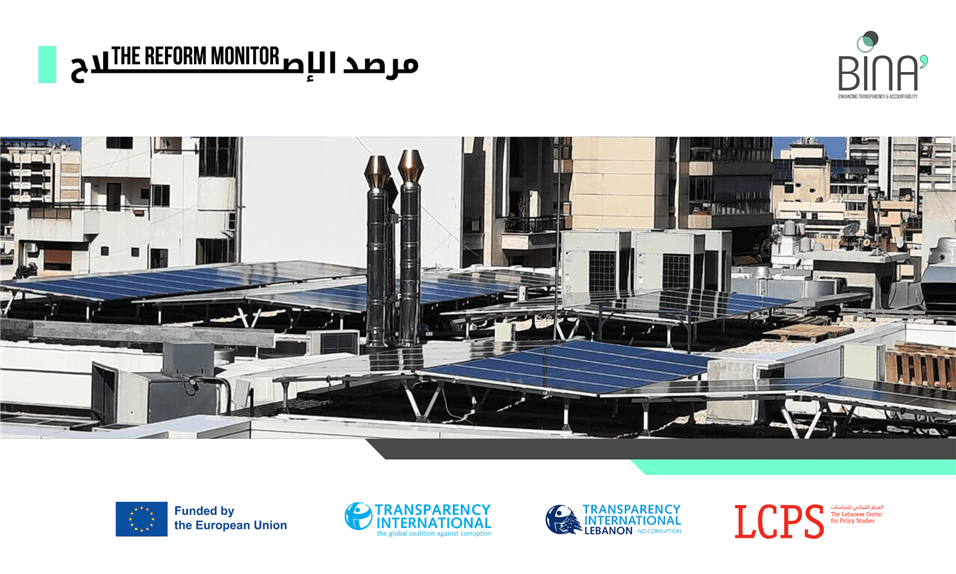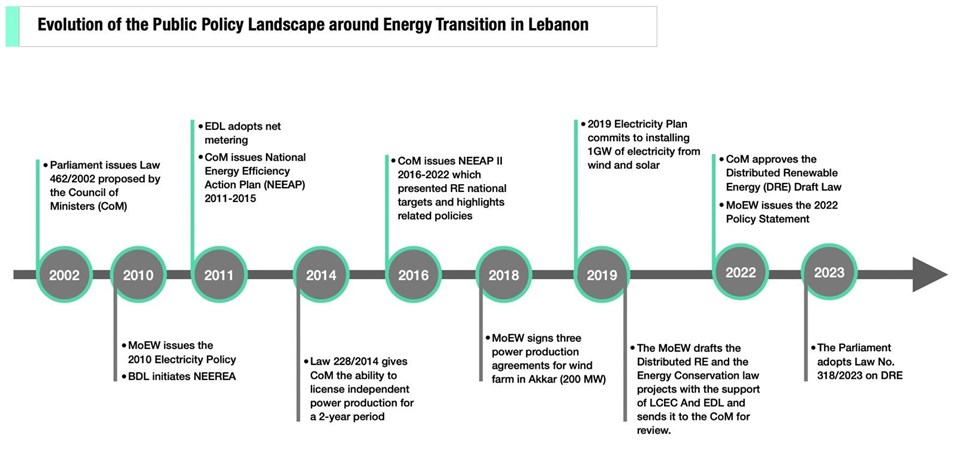-
EnergyFeb 07, 2024
Regulating the Energy Transition: Lebanon’s New Law on Distributed Renewable Energy
- Ali Taha, Rasha Akel

As part of its advocacy efforts towards building a people-centered and sustainable recovery from the Beirut port explosion and its endeavors to promote inclusive and equitable social justice, as well as foster trust between individuals, entities, and the Lebanese government, the Lebanese Center for Policy Studies (LCPS) partnered with Transparency International (TI) and its local chapter, Transparency International Lebanon – No Corruption, to issue “The Reform Monitor.” The topics covered by the monitor are linked to the areas of reform, recovery, and reconstruction (3RF). The monitor falls within the Building Integrity and National Accountability in Lebanon (BINA’) project, which is funded by the European Union. The views expressed in the monitor do not necessarily reflect those of the donor.
What’s the issue at hand?
As a result of the almost complete breakdown of the state-owned utility Electricité Du Liban (EDL) in recent years, many households and enterprises in Lebanon have resorted to renewable energy (mainly solar power) to generate electricity. In 2022, Lebanon imported a total of 80,315 tons of solar panels, which is four times what it imported in the previous ten years altogether (Lebanese Customs Administration). In monetary terms, more than USD 500 million was invested by the private sector in decentralized solar applications during the crisis (Boukather, 2023). This excludes the solar power installations financed by international donors and aid organizations. By June 2023, it is estimated that the total capacity of decentralized solar installations reached 1,000 MW (Lebanese Center for Energy Conservation).
The intermittency of sun light, the quality of PV cells, high temperatures, the direction of the panels, their geographic location, shading, and the accumulation of dust and dirt are all factors that contribute to a lower performance by these installed solar panels. This means that in reality, the installed panels will perform at a much lower capacity (21% of maximum capacity), far below what is needed to compensate for EDL’s plummeting power generation. Speeding up the energy transition relies on an incentivizing regulatory framework, which until recently was largely missing from Lebanon’s energy policies.
To address this gap and to increase the share of renewables to 30% of the total energy mix by 2030, the Council of Ministers (CoM) approved on March 23, 2022, a draft law developed by the Lebanese Center for Energy Conservation (LCEC), together with the Ministry of Energy and Water (MoEW) and EDL, on Distributed Renewable Energy. Amid a presidential vacancy and the consequent constitutional limitations that it imposes on the legislative process, this law found a place on the agenda of the parliament’s last legislative session of 2023 on December 14, during which it was passed. The agenda of such sessions is exclusive to the most urgent of public matters, indicating enough consensus among the different political parties in the assembly on the pressing need to resolve the country’s persisting energy crisis.
About the Law
Consumers, according to this new legislation, can now exchange the electricity they produce from renewable energy (RE) sources with EDL’s, or store it in the grid for 12-month cycles, at the end of which they are compensated for a percentage of the remaining surplus. As for the production and direct sale of electricity from RE technologies, authorized producers can use the public grid to distribute their generated capacity nationwide following an agreement signed with EDL and for a grid utilization fee, the ceiling of which is determined by the Electricity Regulatory Authority (ERA). They can also engage in direct sales without using EDL’s infrastructure when the end-users are on an adjacent estate. In both cases, the sale of electricity takes place according to purchase agreements signed directly between the two. The law limits the capacity of privately owned RE systems to 10 megawatts (MW).
Law No. 318/2023 vests significant powers and duties to the ERA, whose establishment is enshrined in law No. 462 of 2002 (Electricity Sector Organization), but is yet to become a reality. Pending the appointment of its members, the ERA is central to an effective implementation of this piece of legislation, as it is the public entity responsible for rendering a granular expansion on the otherwise broad regulatory aspects of the law.
Among its many authorities, the ERA will determine eligibility criteria for net-metering subscribers, applicable RE systems, the procedure and conditions for the authorization to connect to the grid, and the assignment of related tariffs. Regarding the direct sale of electricity by private RE generators, the authority sets the necessary procedures and principles for electricity supply, provides templates of power purchase agreements, and specifies ceilings for fees depending, among several other factors, on the time of consumption during the day, and during the year. The scope of authority for both the ERA and EDL, and a few of their responsibilities, as delineated by the law, are listed in the table below.

Additionally, the authority should create and maintain a database for the electricity produced from RE sources and submit an annual report to the MoEW on the law’s implementation (article 6). Article 8 of the law stipulates the establishment of a new specialized directorate inside EDL that manages all RE-related interactions between the private sector and the company. The administrative structure of this directorate and the scope of its responsibilities will be determined by a decree issued by the CoM.
Policy Landscape
The economic crisis and its detrimental impact on the energy sector in Lebanon certainly catalyzed the legislative process that culminated in the adoption of this law. However, the latter is a policy instrument among several others that aim to implement the government’s energy policy outlined in Lebanon’s country outlook 2020, in MoEW’s 2019 Policy Paper, and its more recent MoEW’s 2022 Policy Statement.
Among the different policy instruments, the most comprehensive is Law 462/2002 (Regulating the Electricity Sector), which established the ERA and laid the foundation for the privatization and liberalization of the electricity sector by ending EDL’s monopoly over the production and distribution of electricity. This law, however, has never been implemented (Ayoub et al., 2021; Ahmad, 2020).
Moreover, a net metering mechanism was introduced by EDL in 2011 through circular 32-318. Although this law adds to the growing set of public policy instruments related to Lebanon’s energy policy, there remain some gaps in the regulatory framework governing the country’s booming RE sector. The lack of an adequate and up-to-date standardization and certification system is one major regulatory gap that impedes the government's ability to control quality and safety along the RE value chain. This includes the end-of-life management for these deployed RE technologies, the improper disposal of which poses a risk to public safety.
Challenges
The successful implementation of the Distributed Renewable Energy law faces several obstacles, the most notable of which is the failure to appoint the ERA’s members, especially given it has several key functions, as mentioned above. Furthermore, given that EDL is to provide financial compensation to subscribers in the net metering system for the surplus fed-in capacity, the current electricity billing system needs to be improved and strengthened. It should also be mentioned that a stable grid that consumers can trust for their power supply will rely on the company’s ability to secure a base load generation capacity.
Access to financing opportunities is another major obstacle. Lebanon’s central bank (BDL), which in 2010 provided subsidized loans aimed to stimulate the growth of this sector, is currently unable to do so due to the economic crisis. Furthermore, the collapse of the banking sector is impeding access to financing opportunities from international financial institutions.
This constitutes a major challenge to the sector’s development and is currently being mitigated through funds by international donors. For example, in March 2023, a USD 20 million Solar and Renewable Energy Fund was created by the United States Agency for International Development (USAID) through its Trade and Investment Facilitation Activity and Lebanon Investment Initiative. The EU is also providing support to the private sector through its Cedro V program (implemented by UNDP) and a new Green Agenda that will provide EUR 22 million to the public sector for both energy efficiency and distributed renewable energy measures.
Why is this important?
The Distributed Renewable Energy law is a step in the direction of resuscitating Lebanon’s ailing electricity sector. In addition to putting the safety of users at risk, if kept unregulated, the renewable energy market generates significant losses from damages and inefficiencies. Furthermore, reforming the energy sector is one of the main demands of the International Monetary Fund, World Bank, and donor agencies. It constitutes part of the fourth pillar in Lebanon’s 3RF (Reform, Recovery, and Reconstruction Framework), titled Improving Services and Infrastructure. Borrowing by the government to provide electricity from fuel oil is estimated to have cost Lebanon about USD 45 billion (45% of public debt), making reform of the electricity sector a pressing issue.
References:
Lebanese Customs Administration, with the Contribution of PhD Candidate Camillo Stubenberg. Cited in Boukather, Carol Ayat. 2023. “Re-energize Lebanon: 5 Action Steps to Rebuilding Lebanon’s Collapsed Electricity Sector”. Issam Fares Institute for Public Policy and International Affairs.
Lebanese Center for Energy Conservation. “Decentralized RE Law”.
Lebanese Center for Energy Conservation cited in Boukather, Carol Ayat. 2023. “Re-energize Lebanon: 5 Action Steps to Rebuilding Lebanon’s Collapsed Electricity Sector”. Issam Fares Institute for Public Policy and International Affairs.
Ali Taha is a political scientist and researcher at LCPS. His research focuses on public policy, governance, and energy. He is also involved in writing “The Government Monitor” series, organizing educational webinars, and supervising the LCPS Legislative Tracker, an interactive online tool that allows users to analyze the policy-making agenda of the Lebanese government. Prior to LCPS, Ali worked as a program director at Delegations for Dialogue, facilitating research in conflict zones. He holds an MSc in International Relations from the University of Amsterdam, specializing in energy politics, and a BA in Political Science/International Affairs from the Lebanese American University.
Rasha Akel is a junior researcher at the Lebanese Center for Policy Studies. She has a bachelor of arts degree in Sociology-Anthropology from the American University of Beirut with high distinction. She also has a master of arts degree in Migration Studies from the Lebanese American University. During her undergraduate education, she worked as a tutor at university. During her graduate studies at LAU, she worked as a research assistant at the Institute for Migration Studies.